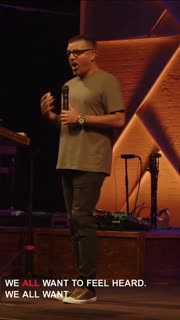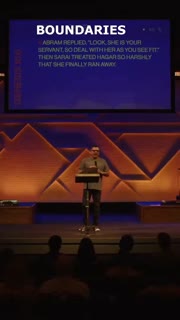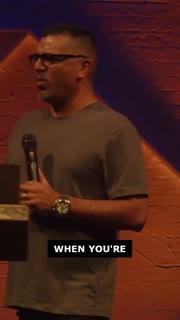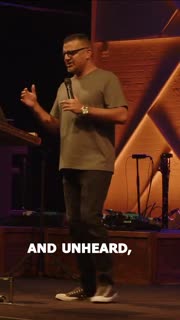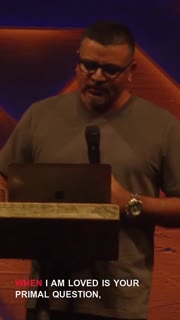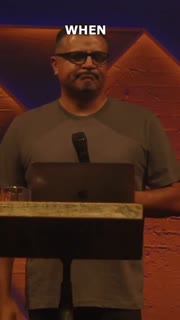Finding Assurance: God's Love and Our Worth
Devotional
Sermon Summary
Bible Study Guide
Sermon Clips
### Quotes for Outreach
1. "Raise your hand if you've ever felt unseen or like unheard. That's a lot of us. Thank God I'm not just preaching to myself. That's most of the room. For a while now, my 14-year-old Caleb, he's been coming to me and saying, Dad, show me love. And he will say, Dad, dame un besito. Which means, Dad, give me a kiss. And then, Dad, hug me. I need more love from you. Can you just hug me?" [39:13] (32 seconds)
2. "We all want to feel heard. We all want to feel important. We all want to feel appreciated. When somebody mentions our name, when somebody thinks about us and wants us in their team, we all want that. There's nothing, there's not a better feeling out there than feeling loved by people. But here's the kicker. Many times, this is not what we get. Many times, this is not what we experience in life." [44:30] (27 seconds)
3. "Boundaries might seem like barriers, but are the key to healthier, more freeing relationships. See, if you want to lose weight, you set boundaries on certain things that you don't want to do, you don't want to eat. And this is going to benefit you to become healthier. I am on track. I want to lose at least, believe it or not, at least 20 more pounds. And I have three weeks without sugar, burgers, or Coca-Cola." [54:52] (33 seconds)
4. "When you're tempted to keep people at a distance, remind yourself that healthy boundaries help you love fully. And maybe you're here, maybe you're online. Maybe you're thinking, you know what, this is easier said than done. I'm going to ask God to help me. But whatever happened to the slave? Whatever happened to Hagar? Did God come to the rescue? I mean, was her primal question ever answered again with a yes?" [57:13] (33 seconds)
5. "See, even though sometimes we feel as if nobody sees us, God sees us. God sees everything we do. He sees our hurts, our goals, our brokenness. He sees all of you. What else changed for Hagar? Genesis 16, 8 says this. The angel said to her, Hagar, Sarai's servant, where have you come from and where are you going? I'm running away from my mistress, Sarai, she replied. See, not only did God see Hagar, as she was huffing and puffing and running away at full speed. But she also understood that God took time to hear her in her hurts while she was hurting and running." [59:55] (54 seconds)
### Quotes for Members
1. "And as we could probably relate to all seven of these primal questions, there's one at the core of our life. There's one apex question that drives our emotions, our impulses, our thoughts, our reactions. And when life is good, when people are good, and when our answer is answered with a yes, we sleep at night, and we're happy. God is good, and we are good with our family. But the problem comes when our primal question is answered with a no." [37:36] (32 seconds)
2. "If you grew up feeling unseen and unheard, then often the primal question that imprints on you is, am I loved? Am I loved? Do others see me? Do others know me? Do others feel connected to me? In fact, this is probably the primal question that's at the core of a lot of people's mind and life. And this is the internal message that drives our decisions, our triggers, our reactions. And this is especially true if you grew up in any sort of abuse, if you grew up in a home where you were ignored." [42:49] (42 seconds)
3. "When I am loved is your primal question, your impulses are to seek codependent love. And what this says is this, I will lose myself and your needs in order to feel needed by you. And maybe for you, this, the way you lose yourself plays out like maybe you're not getting enough sleep. Maybe you're not getting enough rest or enough downtime because you're so busy taking care of somebody else's responsibilities." [45:55] (26 seconds)
4. "When I am loved is your primal question, your impulses are to seek wounded love. And what this means is like, you know what, I'll take whatever love I can get, even though it hurts. Maybe for you this plays out as making excuses for your partners or your friends' hurtful comments, hoping that if you stay, things will eventually get better. Maybe it's overlooking frequent indifferences. Or how they make you feel undervalued. Because for you, any negative attention is better than no attention." [47:26] (39 seconds)
5. "When you live out your primal truth, knowing that God sees you, that God hears you, that God knows you, something powerful happens. It frees you to live your life in confidence, knowing that no matter what happens, God already knows you. That God already loves you. It frees you to think that you are called to make a positive impact in your community. It frees you to create environments where others know as well that they are seen and heard." [01:03:39] (36 seconds)
Ask a question about this sermon
1. "Raise your hand if you've ever felt unseen or like unheard. That's a lot of us. Thank God I'm not just preaching to myself. That's most of the room. For a while now, my 14-year-old Caleb, he's been coming to me and saying, Dad, show me love. And he will say, Dad, dame un besito. Which means, Dad, give me a kiss. And then, Dad, hug me. I need more love from you. Can you just hug me?" [39:13] (32 seconds)
2. "We all want to feel heard. We all want to feel important. We all want to feel appreciated. When somebody mentions our name, when somebody thinks about us and wants us in their team, we all want that. There's nothing, there's not a better feeling out there than feeling loved by people. But here's the kicker. Many times, this is not what we get. Many times, this is not what we experience in life." [44:30] (27 seconds)
3. "Boundaries might seem like barriers, but are the key to healthier, more freeing relationships. See, if you want to lose weight, you set boundaries on certain things that you don't want to do, you don't want to eat. And this is going to benefit you to become healthier. I am on track. I want to lose at least, believe it or not, at least 20 more pounds. And I have three weeks without sugar, burgers, or Coca-Cola." [54:52] (33 seconds)
4. "When you're tempted to keep people at a distance, remind yourself that healthy boundaries help you love fully. And maybe you're here, maybe you're online. Maybe you're thinking, you know what, this is easier said than done. I'm going to ask God to help me. But whatever happened to the slave? Whatever happened to Hagar? Did God come to the rescue? I mean, was her primal question ever answered again with a yes?" [57:13] (33 seconds)
5. "See, even though sometimes we feel as if nobody sees us, God sees us. God sees everything we do. He sees our hurts, our goals, our brokenness. He sees all of you. What else changed for Hagar? Genesis 16, 8 says this. The angel said to her, Hagar, Sarai's servant, where have you come from and where are you going? I'm running away from my mistress, Sarai, she replied. See, not only did God see Hagar, as she was huffing and puffing and running away at full speed. But she also understood that God took time to hear her in her hurts while she was hurting and running." [59:55] (54 seconds)
### Quotes for Members
1. "And as we could probably relate to all seven of these primal questions, there's one at the core of our life. There's one apex question that drives our emotions, our impulses, our thoughts, our reactions. And when life is good, when people are good, and when our answer is answered with a yes, we sleep at night, and we're happy. God is good, and we are good with our family. But the problem comes when our primal question is answered with a no." [37:36] (32 seconds)
2. "If you grew up feeling unseen and unheard, then often the primal question that imprints on you is, am I loved? Am I loved? Do others see me? Do others know me? Do others feel connected to me? In fact, this is probably the primal question that's at the core of a lot of people's mind and life. And this is the internal message that drives our decisions, our triggers, our reactions. And this is especially true if you grew up in any sort of abuse, if you grew up in a home where you were ignored." [42:49] (42 seconds)
3. "When I am loved is your primal question, your impulses are to seek codependent love. And what this says is this, I will lose myself and your needs in order to feel needed by you. And maybe for you, this, the way you lose yourself plays out like maybe you're not getting enough sleep. Maybe you're not getting enough rest or enough downtime because you're so busy taking care of somebody else's responsibilities." [45:55] (26 seconds)
4. "When I am loved is your primal question, your impulses are to seek wounded love. And what this means is like, you know what, I'll take whatever love I can get, even though it hurts. Maybe for you this plays out as making excuses for your partners or your friends' hurtful comments, hoping that if you stay, things will eventually get better. Maybe it's overlooking frequent indifferences. Or how they make you feel undervalued. Because for you, any negative attention is better than no attention." [47:26] (39 seconds)
5. "When you live out your primal truth, knowing that God sees you, that God hears you, that God knows you, something powerful happens. It frees you to live your life in confidence, knowing that no matter what happens, God already knows you. That God already loves you. It frees you to think that you are called to make a positive impact in your community. It frees you to create environments where others know as well that they are seen and heard." [01:03:39] (36 seconds)

